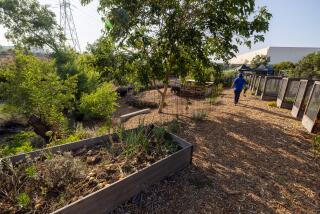UCLA Will Create Training Program for Science Teachers
UCLA has received a $330,000 grant to create a support program for new science teachers in the Los Angeles and Long Beach unified school districts.
Project director Janet Thornber said the award, given to UCLA’s Center for Academic Interinstitutional Programs, a division of the Graduate School of Education, will be used to give additional training to new science teachers at 15 junior high schools in the Los Angeles district and five in Long Beach. The grant was made by the California Postsecondary Education Commission and the state Department of Education.
“Our goal is to ensure that science teachers stay in their teaching positions despite the difficulties they encounter during their first years of teaching,” Thornber said. “We want to help them acquire excellent teaching skills and . . . specific skills for working with a diverse student population.”
In Short Supply
According to the Department of Education, science teachers, as are mathematics teachers and bilingual teachers, are chronically in short supply. Almost 10% of the state’s 7,500 public school science teachers lack the science training for a regular teaching credential in the field and have only emergency credentials, an education official in Sacramento said.
Robert L. Grossman of the Los Angeles County Office of Education and others active in teacher recruitment say science teachers are scarce because individuals trained in science are often lost to graduate school programs or better-paying jobs in other fields.
The first few years in the classroom are often difficult, but they can be especially tough for neophyte science teachers, Thornber said. “It’s really hard starting out--doing hands-on science, preparing labs and just learning to teach.”
Junior high science teachers often face the additional problem of poorly prepared students, she said. “In general, there hasn’t been a lot of emphasis on science in elementary schools.”
The program, funded for three years, will begin this fall when 20 beginning teachers, including a number from schools with large minority enrollments, are nominated by their principals. Each new teacher will be matched with a veteran “buddy” teacher from his or her school.
Need Enthusiasm
The newcomers will be encouraged to turn to the veterans for advice and encouragement. The experienced teachers, Thornber said, “must have a lot of enthusiasm for science teaching. That’s one of the criteria we’re going to use.”
During the first year of the program, beginning and experienced teachers will attend a series of Saturday workshops where exemplary science teachers will present model lessons.
Thornber said the demonstrations will include ways to encourage students to be active, not passive, learners. They will also include advice on reaching students with limited fluency in English. In addition, the teachers will attend a summer institute next year on the UCLA campus.
During the second year of the program, teachers will attend additional Saturday workshops to reinforce what they have learned. Twenty more new teachers will start the program the second year.
Ultimately, Thornber said, the participants should become a resource, ready and able to share what they have learned with other science teachers in their districts.
More to Read
Sign up for Essential California
The most important California stories and recommendations in your inbox every morning.
You may occasionally receive promotional content from the Los Angeles Times.










